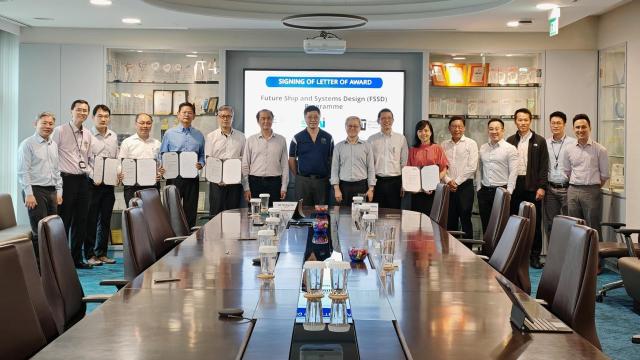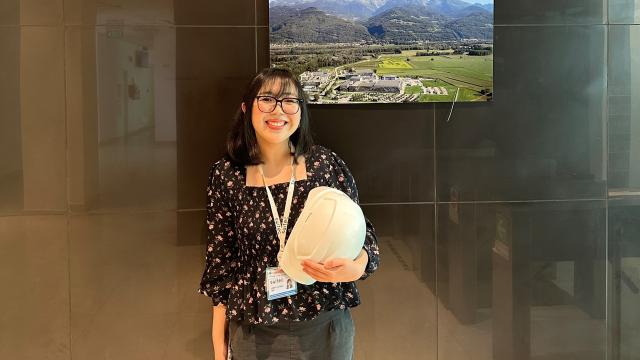SIT is empowering working professionals to acquire skills incrementally, on a need basis and at a pace comfortable for the learner. Stackable Micro-credentials hold the answer to upskilling in a VUCA world.

SIT's Assistant Provost (Continuous Learning), A/Prof Forest Tan (left) and Assistant Provost (Applied Learning), A/Prof May Lim (right) presented at the CBExchange Asia-Pacific 2024 on 29 February. (SIT Photo: Keng Photography/Tan Eng Keng)
Artificial intelligence (AI) has brought about a series of changes in the workspace along with the looming threat of job replacements in the future. It could also widen the gap between high-skilled and low-skilled workers if the latter aren't equipped with the skills to adapt.
The World Economic Forum (WEF)’s The Future of Jobs Report 2023 has painted a future where machines are predicted to complete 43% of tasks by 2027 – a 9% increase compared to 2022. Additionally, it reports that up to 23% of today’s jobs will change, with 44% of workers' core skills expected to change in the next five years.
These data all point to one thing – that Institutes of Higher Learning (IHLs) have to be agile in their curriculum when educating the current crops of workers to keep up with the ever-changing demands of the workplace.
“It means that higher education has to raise the bar as we need to train our learners for what humans should be doing, including high-level and cognitive skills that humans should be good at,” said A/Prof May Lim, Assistant Provost (Applied Learning), Singapore Institute of Technology (SIT).
She was speaking at the CBExchange Asia Pacific 2024 conference in Singapore alongside A/Prof Forest Tan, Assistant Provost (Continuous Learning), SIT, as they engaged the audience in a dialogue session on embracing competency-based education (CBE) through stackable micro-credentials.
Firmly believing in the benefits of CBE, SIT launched the Competency-based Stackable Micro-credential (CSM) pathway for in-employment learners in 2023. In-employment learners are trained in the industry's most sought-after competencies through micro-credentials that could earn them a specialist certificate and stack to an SIT degree.
A Revolutionary Education Path
On a constant mission to revamp education for learners through competency-based education, SIT emphasises mastery of skills and knowledge by demonstrating proficiency in specific competencies aligned to industry transformation roadmap.
A/Prof Tan elaborated: “By introducing the CSM pathway, we are looking into the learner's ability to apply competency skills to real-world situations they will encounter in the workplace.”
The key differences between traditional and competency-based education are:

Embracing Recognition of Prior Learning (RPL)
To formally recognise an employee's existing skill set, the Recognition of Prior Learning (RPL) framework allows for SIT to objectively evaluate an individual's competencies. This is acquired through relevant certifications, formal credentials, industry training, work experience, and assessment that will grant them access to or credits towards further education at SIT.
The RPL framework allows learners to accelerate their degree completion and skills development as it eliminates the need to repeat what they already know. “RPL has the ability for us to unlock potentials. It allows us to honour experience and not just assess someone on GPA score or a certificate. We can also increase accessibility, especially for those who did not get a chance to go to a university in their education journey,” A/Prof Lim explained.
Bolstering Support with Success Coaches
To assist and motivate in-employment learners who have embarked on the CSM pathway, SIT introduced ‘Success Coaches’ for guidance. “These are people connected with the learners and will advise them on things outside the co-curriculum, such as time management, to ensure they succeed. We recognised that successful course completion has much to do with motivation,” A/Prof Tan added.
SIT is also bracing itself to keep up with diverse learners. It will embrace AI to ensure a better learning experience through analytics and interactive content. “We are beginning to see the different student personas amongst in-employment learners. By utilising technology, we can better understand the diverse learning needs of our learners and work together to enable them to learn at their best,” A/Prof Lim chimed.

A/Prof May Lim (right) said that SIT is committed to creating personalised learning experiences for learners using AI. (SIT Photo: Keng Photography/Tan Eng Keng)
Potential Challenges and Cultivating Industry Support
While reshaping the educational pathway for in-employment learners, SIT is fine-tuning its programmes to help learners overcome anticipated challenges such as balancing study, work and family commitments. Even with the flexible lessons, this remains a teething issue for learners to cope with and could potentially demoralise current or prospective workers on upskilling efforts.
There is also a need to cultivate employees' and employers’ view on micro-credentials. A/Prof Tan said: “Micro-credentials is an over-used word. We need to spread the message that, in our case, when we talk about micro-credentials, it’s something more significant; it’s not short-term. We need to make sure that employers understand that an employee will be committed to developing competency in certain areas over a period of time and recognise that it is something more sustained.”
A/Prof Tan emphasises the need to bring in all the other stakeholders, such as government agencies, employers, and human resources management as they will play a key role in ensuring a sustainable ecosystem in CBE.
A/Prof Lim concluded her presentation with a call to the audience: “We are very much aware that it’s not all rosy and that there are challenges to upskilling. The road ahead in building an ecosystem of CBE is long, and we can only reach our goal if we’re committed to it.”
![[FA] SIT One SITizen Alumni Initiative_Web banner_1244px x 688px.jpg](/sites/default/files/2024-12/%5BFA%5D%20%20SIT%20One%20SITizen%20Alumni%20Initiative_Web%20banner_1244px%20x%20688px.jpg)


